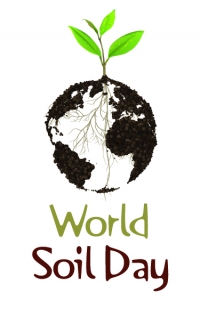The health of our soils, this exceptionally high source of biodiversity, is threatened by human activities more than ever and the use of pesticides destroys soil life and depletes nutrient content. On the World Soil Day, Pesticide Action Network Europe sends out a clear message: “by protecting our soils we protect life on earth” and calls EU policy-makers to enforce sustainable agricultural practices in Member States to protect our ‘source of life’. The future of EU agriculture is here at stake.
A recent study[1] that evaluated over 300 European agricultural top soils[2] confirmed the ubiquity of life-threatening agrochemicals. More than 80% of the samples analysed contained pesticides, with nearly two-thirds having multiple residues. The samples contained 43 different pesticides in total, in some cases up to 13 pesticides in one sample. Glyphosate and its metabolite AMPA, metabolites of DDT (banned 30 years ago) as well as fungicides[3], were the most prevalent compounds. The authors of the same study concluded that “mixtures of pesticide residues in soils are the rule rather than the exception.” This is of extreme concern, due to the fact that the “cocktail effect” of such chemicals is not regulated at all.
The presence of these residues in the pedosphere disturbs nutrient cycles, affects the metabolism of living organisms, but most importantly, those substances transform soils from a source of life to a sterile habitat. In the absence of beneficial organisms, farmers have no other option than to use high quantities of fertilizers and pesticides. The fundamental levels of entire trophic webs are virtually massacred. In turn, as recent studies indicate, the very existence of pollinators, beetles or even birds is threatened.
“What strikes us is that the Commission and Member States still authorise deadly toxic fumigant pesticides like metam sodium or dichloropropene whose aim is to sterilise soils from any source of life. This is not understandable as science has shown that soil life is at the bases of plant health!” Constantin Muraru, Project Officer at PAN Europe said.
Angeliki Lyssimachou, Ecotoxicologist at PAN Europe added: “In the same way, glyphosate destroys soil microorganisms that in turn do not regulate the presence of pathogenic fungi anymore, leading to an increased use of fungicides! There is a major need to turn away from today’s agroindustrial system as alternatives exist! Indeed, there are nature-based solutions that enhance positive interactions in and above the pedosphere and subsequently help us to grow healthy crops in a protected environment.”
Contact PAN Europe, Constantin Muraru, +32 2 318 62 55, constantin [at] pan-europe.info
[1] Pesticide residues in European agricultural soils – a hidden reality unfolded. Silva et al. (2018).
[2] Samples were collected from different cropping systems (e.g. potato, wheat, maize, vineyards and vegetables)
[3] boscalid, epoxiconazole and tebuconazole
